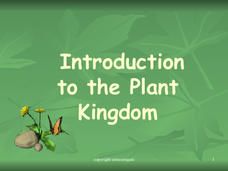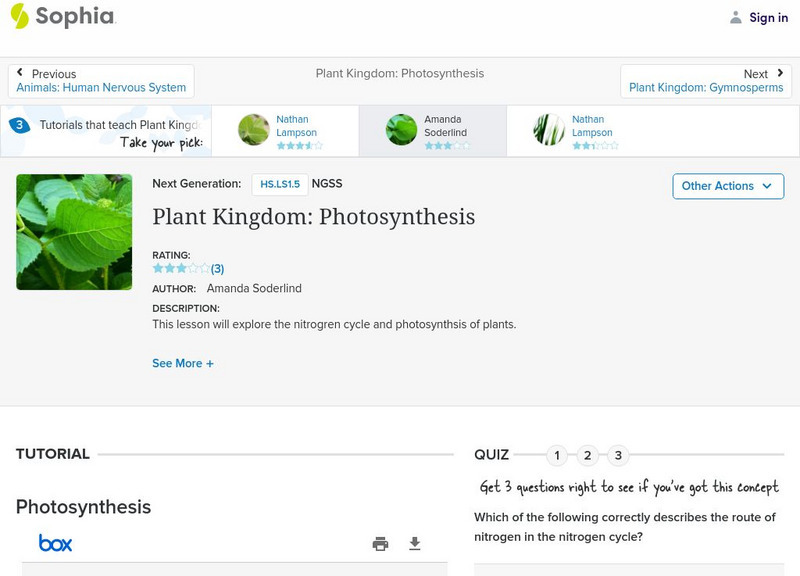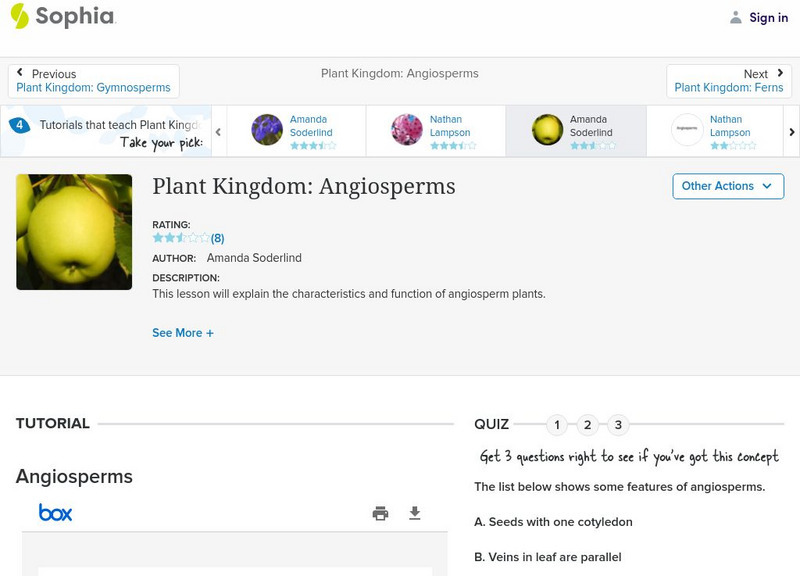Prezi
The Six Kingdoms
Why can't dinosaurs clap their hands? Because they no longer exist. The six kingdoms do exist, and through the presentation individuals discover kingdom names, their description, and view photographs of a few samples.
Biology Junction
Introduction to the Plant Kingdom
Plants provide humans with food, shelter, and medications. Scholars gain a better appreciation for plants after learning their functions, divisions, and early ancestors. Each sub-topic includes slides highlighting vocabulary and...
Biology Junction
Plant Diversity
Ginkgo trees existed for more than 350 million years, and, at this time, only one species still remains. While plant diversity generally increases over geologic time, some interesting exceptions occur. Young scientists learn about plant...
Curated OER
Tic Tac Know Kingdoms
In this PowerPoint, students participate in a variation of tic tac toe in which questions about the animal and plant kingdom are presented and students move to various locations on the game board.
Curated OER
The Five Kingdoms
An overview of the five kingdoms within the biological classification system is presented in this set of five slides. The first lists the objectives of the slide show, and the second gives general characteristics of plant, animal, and...
Curated OER
Kingdom: Fungi
The general characteristics that affect classification of fungi and other organisms in the domain Eukarya are detailed for the students on 12 attractive slides. Teachers can access individual slides to cover life cycles or...
Curated OER
Kingdom: Fungi
The general characteristics of fungus types are presented here. Your class will love the pictures of the amazing features found on these strange living things. The internal and external structures and their functions are highlighted. By...
Curated OER
Living Things
Alive or not? After viewing this presentation, life science learners will know how to answer this question. They are introduced to the seven processes of living systems and the classification hierarchy. Because it only covers...
Curated OER
Science: Grade 4
Building a scientific vocabulary is important for all students and this presentation provides a list of words typical to 4th grade science curriculum. Tip: Adding images to this resource will make the vocabulary more accessible to ELLs...
Sophia Learning
Sophia: Plant Kingdom: Ferns: Lesson 3
This lesson will explain the characteristics and function of fern plants. It is 3 of 4 in the series titled "Plant Kingdom: Ferns."
Sophia Learning
Sophia: Plant Kingdom: Gymnosperms: Lesson 3
This lesson will explain the characteristics and function of gymnosperm plants. It is 3 of 3 in the series titled "Plant Kingdom: Gymnosperms."
Sophia Learning
Sophia: Plant Kingdom: Gymnosperms: Lesson 1
This lesson will explain the characteristics and function of gymnosperm plants. It is 1 of 3 in the series titled "Plant Kingdom: Gymnosperms."
Sophia Learning
Sophia: Plant Kingdom: Mosses: Lesson 3
This lesson will explain the characteristics and function of moss plants. It is 3 of 3 in the series titled "Plant Kingdom: Mosses."
Sophia Learning
Sophia: Plant Kingdom: Photosynthesis: Lesson 2
This lesson will explore the nitrogren cycle and photosynthsis of plants. It is 2 of 3 in the series titled "Plant Kingdom: Photosynthesis."
Sophia Learning
Sophia: Plant Kingdom: Algae: Lesson 3
This lesson will explain the characteristics and function of algae plants. It is 3 of 3 in the series titled "Plant Kingdom: Algae."
Sophia Learning
Sophia: Plant Kingdom: Angiosperms
In this illustrated introduction to angiosperms, learn about the structure and other characteristics of flowering plants.
Sophia Learning
Sophia: Plant Kingdom: Angiosperms
Take a look at this illustrated introduction to flowering plants characterized as angiosperms.
Tom Richey
Slide Share: Overview of Six Kingdoms
This slideshow provides an overview of the six kingdoms.
Sophia Learning
Sophia: Plant Kingdom: Two Approaches to Learn About Nature
Take one of two approaches when investigating nature, using either inductive or deductive reasoning.

















